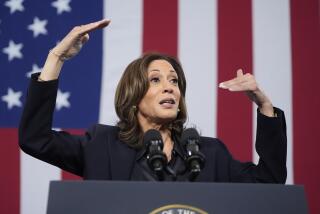Democratic Presidential Hopefuls Seek Labor Support : Hart Attempts to Heal 1984 Wounds; Biden, Gephardt Also Address AFL-CIO Meeting
- Share via
BAL HARBOUR, Fla. — Three 1988 Democratic presidential hopefuls--former Colorado Sen. Gary Hart, Delaware Sen. Joseph R. Biden Jr. and Missouri Rep. Richard A. Gephardt--on Friday made earnest but unstated bids for labor support at a conference of high-ranking AFL-CIO leaders here.
Hart used the occasion to try to heal the wounds left over from his 1984 presidential campaign, when he attacked Walter F. Mondale as the candidate of “the special interests.” The Democratic standard-bearer had been endorsed by the AFL-CIO.
Biden and Gephardt tried to use their appearances to overcome a major problem that they share--their unfamiliarity with many union leaders and political activists. Each relied on his strong suit, which for Biden was his impassioned rhetoric and for Gephardt was his tough position on curbing the U.S. trade deficit, an issue close to labor’s heart.
43 AFL-CIO Unions
The forum was the conference of the Maritime Trades Department of the AFL-CIO, made up of 43 of the labor federation’s 92 member unions. The conference met in this South Florida resort community because the annual winter meeting of the AFL-CIO Executive Council is scheduled here next week.
No one yet knows whether the AFL-CIO will endorse a candidate for the Democratic nomination in 1988 as it did in 1984, when it gave its full backing to Mondale. But everyone agrees that, even if the federation does not throw its collective weight behind one candidate, many of the individual unions will be important factors in the contest for the nomination.
In his 20-minute talk to the 200 or so assembled union leaders, Hart tried to soften some of the hard feelings left over from 1984 with humor. Also, he cited some of the legislative battles he had fought at labor’s side over economic and foreign policy issues, and he emphasized his interest in rehabilitating the country’s depleted fleet of merchant ships.
Source of Money
Contending that funds saved by reducing dependence on nuclear weapons could be used to bolster the merchant marine, he said: “If this nation needs anything in addition to a steel industry, it needs a merchant marine capability.”
Hart has irritated some union leaders by opposing tough action against U.S. trading partners. When asked to state his position on the issue, he contended that “there is no single solution” to the U.S. trade deficit. He said he would favor sanctions, tariffs, quotas and similarly harsh measures “only if imposed in connection with an industrial policy that makes this nation competitive,” a formula that did not satisfy some union leaders.
“We would like a more forceful answer on trade,” said Gerald McEntee, president of the American Federation of State, County and Municipal Employees.
For his part, Biden talked twice as long as Hart and got more than twice as much applause for a version of his standard stump speech, tailored for labor consumption. Underlining the importance of the issues at stake in the 1988 presidential election, Biden delivered a stark warning to union leaders that “outright war” had been declared against them by business interests during the Reagan presidency.
‘What Is at Stake’
“The chambers of commerce understand what is at stake,” Biden said. “They are about the business of seeing to it that your say and your share in the economic bounty and prosperity of America are fundamentally changed. If you don’t understand that, you’re in the wrong business.”
Biden, who has been undecided about whether to seek the presidency, appeared to be moving closer to a positive decision in the last few days. When asked to compare himself to New York Gov. Mario M. Cuomo, also a potential candidate, he said: “I think only one of us is going to run, and it’s probably going to be me.”
Gephardt, who is scheduled to be the first Democrat to formally declare his candidacy for 1988 with an announcement on Feb. 23 in his native St. Louis, stressed the need for tough measures to reduce the huge U.S. trade deficit.
“The only thing our trading partners understand is our willingness to close our markets if they aren’t willing to open theirs,” he said. “Nothing short of that is going to get us free trade.”
Noting that some observers had suggested that Democrats should soften some of their legislative proposals for remedying the trade imbalance, Gephardt said he is willing to listen to suggestions for compromise. But, he said: “I’m not going to back off and I don’t think the Democratic Party is going to back off from an aggressive stance to demand fair trade treatment for this country.”
More to Read
Get the L.A. Times Politics newsletter
Deeply reported insights into legislation, politics and policy from Sacramento, Washington and beyond. In your inbox twice per week.
You may occasionally receive promotional content from the Los Angeles Times.










